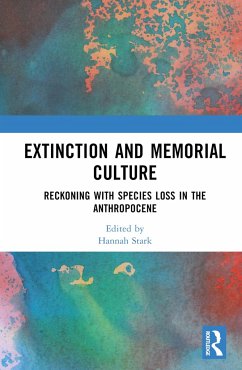This book considers how we encounter and make meaning from extinction in diverse settings and cultures. It brings together an international and interdisciplinary range of scholars to consider how extinction is memorialised in museums and cultural institutions, through monuments, in literature and art, through public acts of ritual and protest, and in everyday practices. In an era in which species are becoming extinct at an unprecedented rate, we must find new ways to engage critically, creatively, and courageously with species loss. Extinction and Memorial Culture: Reckoning with Species Loss in the Anthropocene develops the conceptual tools to think in complex ways about extinctions and their aftermath, along with providing new insights into commemorating and mourning more-than-human lives. This book will be of great interest to students and scholars of the environmental humanities, extinction studies, memorial culture, and the Anthropocene.
Hinweis: Dieser Artikel kann nur an eine deutsche Lieferadresse ausgeliefert werden.
Hinweis: Dieser Artikel kann nur an eine deutsche Lieferadresse ausgeliefert werden.








